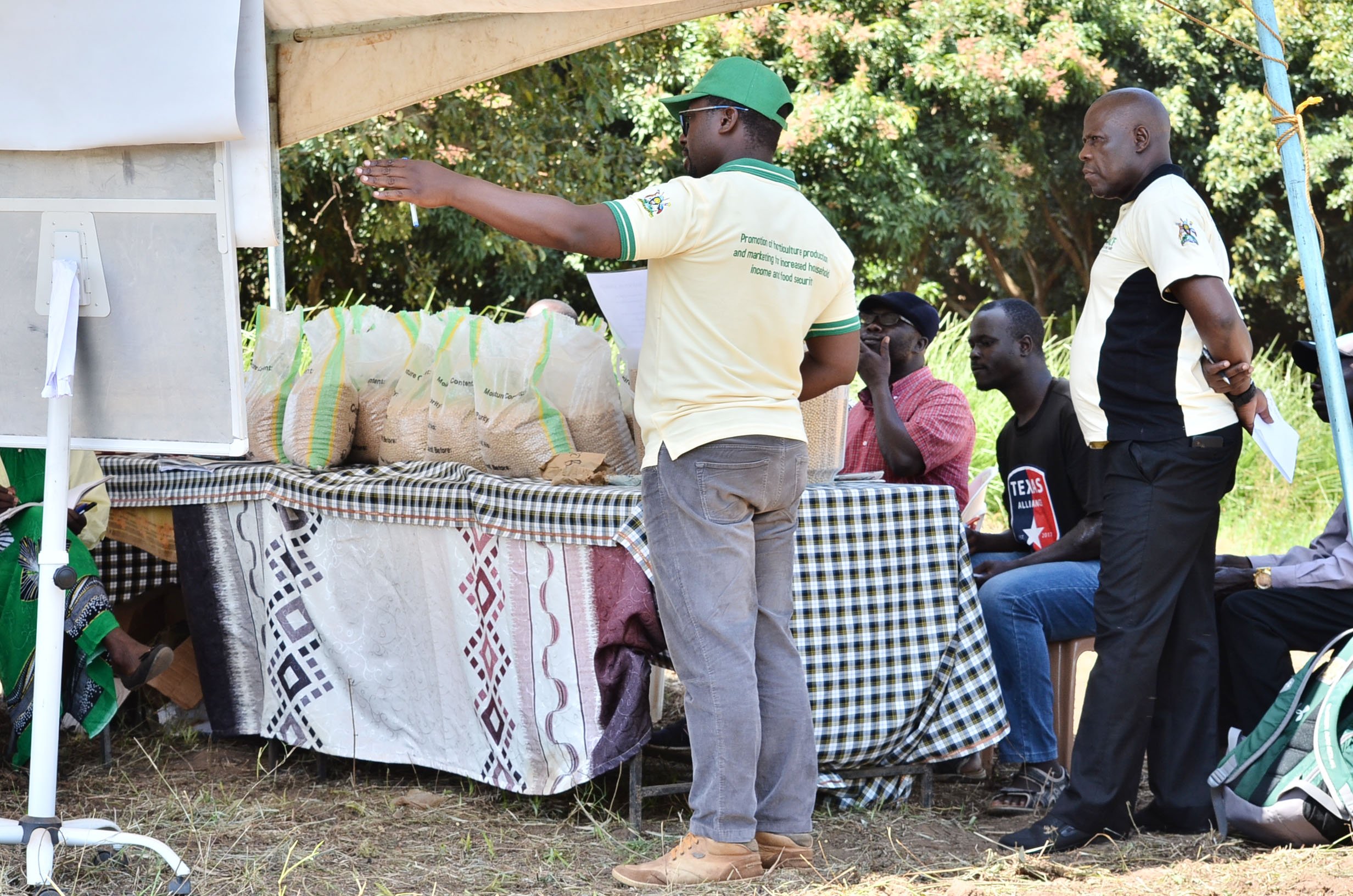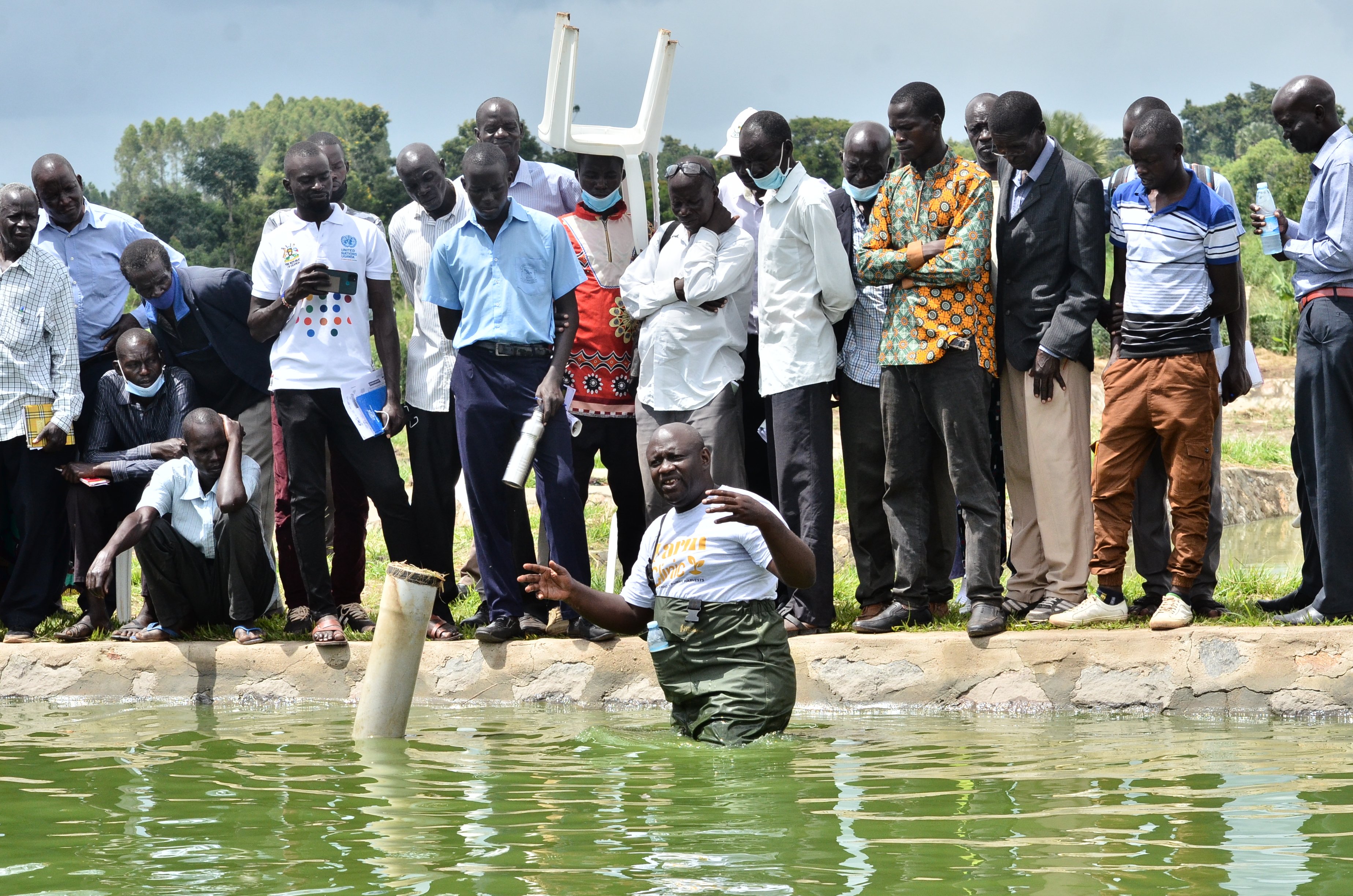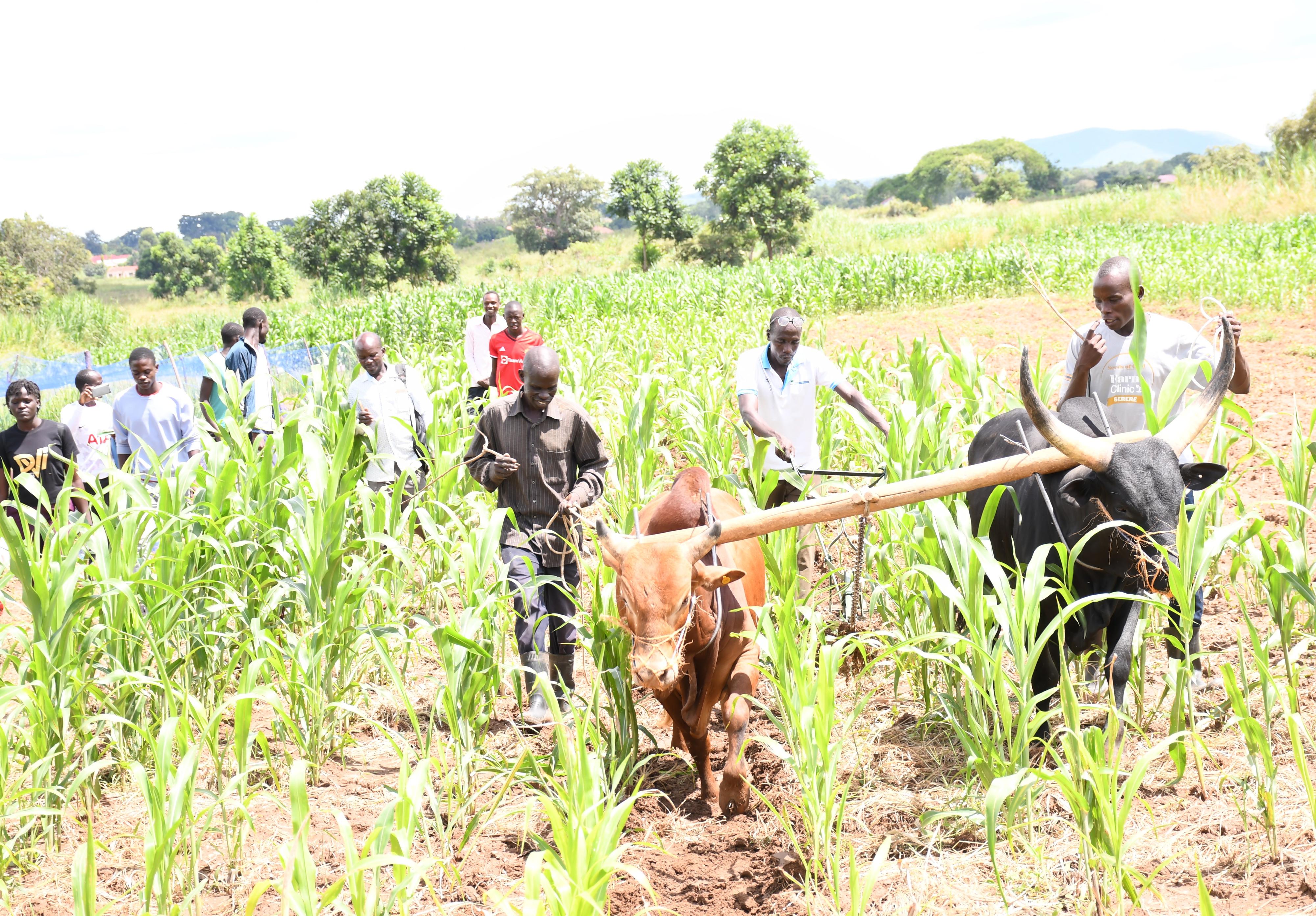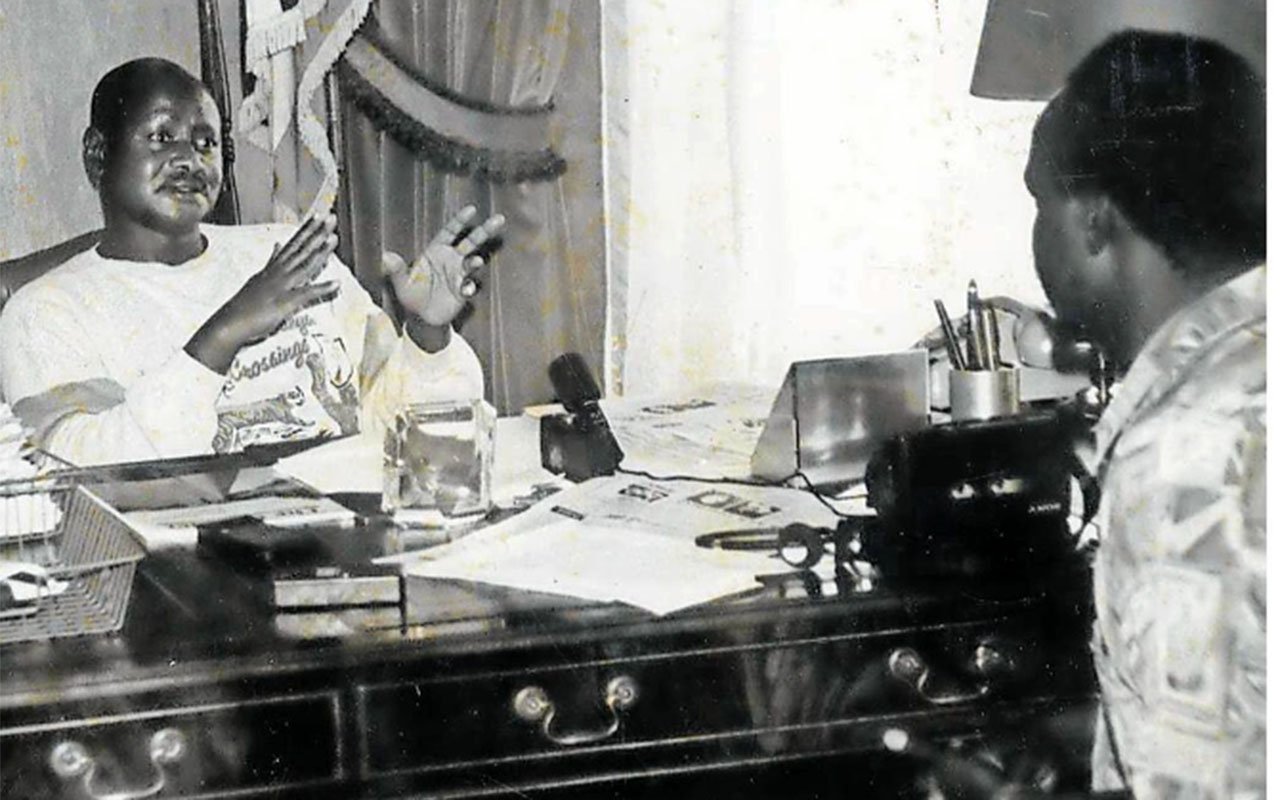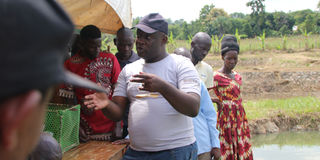
Howard Kasigwa, an aquaculture expert handles the nitty gritties of profitable fish farming. PHOTO/George Katongole
Rose Achola, a resident of Abedo Ber Village in Akano Parish, Lira District first came to the Seeds of Gold Farm Clinic in 2019 curious about improving her livelihood as a bee and cassava farmer.
The area was hit by one of the strongest droughts with studies identifying Lira and Kitgum districts as drought hotspots at timescales of 3, 6 and 12 months. In 2019, Lira-based Ngetta Zonal Agricultural Research Development Institute estimated that four million people in the north lived under threat of famine.
“I was seeking knowledge about farming to improve my income mainly because of the changes in climate that affect us as farmers. We were also being affected by the cassava mosaic which was tormenting farmers,” Achola says.
Achola is one of the farmers who lost their farmland to the LRA rebels around 2013. She started farming under the Naads programme on household production and welfare in the area. Since then she has been keen on improving her craft.
Achola attended sessions where she learned about the most effective strategies farmers use to adapt to climate change including planting improved crop varieties that are early maturing and drought tolerant varieties, irrigation and diversification of crops and livestock, among others.
“This knowledge helped me a lot in implementing new ideas on my farm. I started planting earlier on the onset of the rains and this helped me harvest more. There’s an improvement in my yields as I now also apply fertiliser and plant clean seedlings. I now have enough money to cater for the school fees of my children,” she says.
She stands out as a role model mobilising women in her village to get involved in commercial farming. During Saturday’s Seeds of Gold Farm Clinic in Lira, Achola mobilised women from her village whom she impacted to come and learn about the new techniques of farming that could help transform their livelihoods.
One-stop centre
Last Saturday’s Seeds of Gold Farm Clinic was the best well-attended event in recent years attracting more than 1,500 farmers. The event attracted farmers and exhibitors involved in the agricultural value chain.
This year boasts three events strategically placed for regional accessibility. The Farm Clinic kicked off at Ngetta Zardi, Lira targeting farmers in Lango and Acholi sub-regions. On July 27, Buginyanya in Bulambuli District will be the venue for the second clinic, focusing on eastern Uganda’s agricultural advancements. Kachwekano in Kabale will wrap up the events on September 28.
The one-stop knowledge centre offers a chance to learn best practices and innovative technologies from experts while networking with fellow farmers and share experiences. It also helps farmers witness firsthand the new technologies that can make farm operations more sustainable and profitable.
The National Agricultural Research Organisation (Naro) experts handled five enterprises including; cassava, soybean, fish farming, dairy production and rice farming.
Dr Laban Turyagyenda, the Director of Ngetta Zardi, says the Farm Clinic helps them to reach wider audiences while breaking barriers.
“Many people still think Naro stations are not accessible to farmers. By having the Farm Clinic we ensure that farmers feel welcome any time they need to consult our experts,” Dr Turyagyenda says.
Frank Mugabi, the senior communications officer at Naro says that this was an eye opener to farmer groups that seek to add value to their farm products.
He says the Farm Clinic bridges the information gap. “Cassava, for instance, can be used to make confectionary products. If farmers are empowered it makes our research relevant to the farmers,” he says.
Partnerships
Naro provides expertise and research-based knowledge while financial sponsors such as Bank of Uganda, Stanbic Bank, Jubilee Insurance, Allianz and Heifer International Uganda make the Farm Clinic possible.
Joshua Jaafa Watwaluma, the brand manager for Monitor Publications Ltd says Lira was overwhelming. This was the third time Lira was hosting the Seeds of Gold Farm Clinic and Ngetta Zardi.
Watwaluma explains that enough mobilisation was done on the NMG platforms as well as farmers’ WhatsApp groups. The Naro institute also mobilised farmer groups in communities while partners such as Stanbic Bank, Jubilee Insurance and Bank of Uganda mobilised farmers on their platforms.
“This is the only farmers; event that goes down to the last farmer and we shall keep mobilising more farmers to attend in person,” he says.
Flavia Nalubega, the information and communication manager Heifer International Uganda says by working with smallholder farmers, they enable them close their living income gap and become self-sustainable agribusiness entrepreneurs.
“We work with farmers to ensure value addition to agricultural products. We serve farmers organised in cooperatives or groups, especially women and children to be self-sustaining through providing markets, capital, mechanisation and solarisation. Seeds of Gold farm clinic Lira has given us the platform to meet the farmers and share this information with them. We are optimistic that as they get organised, opportunities of working together to uplift their farming businesses shall arise,” she notes.
In an effort to bridge the financing gap, enhance agricultural productivity and stimulate Uganda’s economic development, the Government of Uganda (GoU) in partnership with Commercial Banks, MDIs, Credit Institutions & Uganda Development Bank (PFIs) set up the (Agricultural Credit Fund) ACF to provide medium to long-term loans to farmers and agro processors at favourable terms.
According to Prossy Namala, Head of Disbursement Agriculture Credit Facility (ACF) at the Bank of Uganda, credit to agriculture has steadily increased both in total and as a percentage of private sector credit.
In 2008, the sector received Shs194.2b, equivalent to 5.2 Percent of commercial bank credit to the private sector. The total increased to Shs1.5t, equivalent to 12.2 percent in 2018.
“The government intervention through the years has supported Agro-industrialisation which has helped to increase the value of agricultural produce and enhance Uganda’s competitiveness while boosting foreign exchange,” she says.

